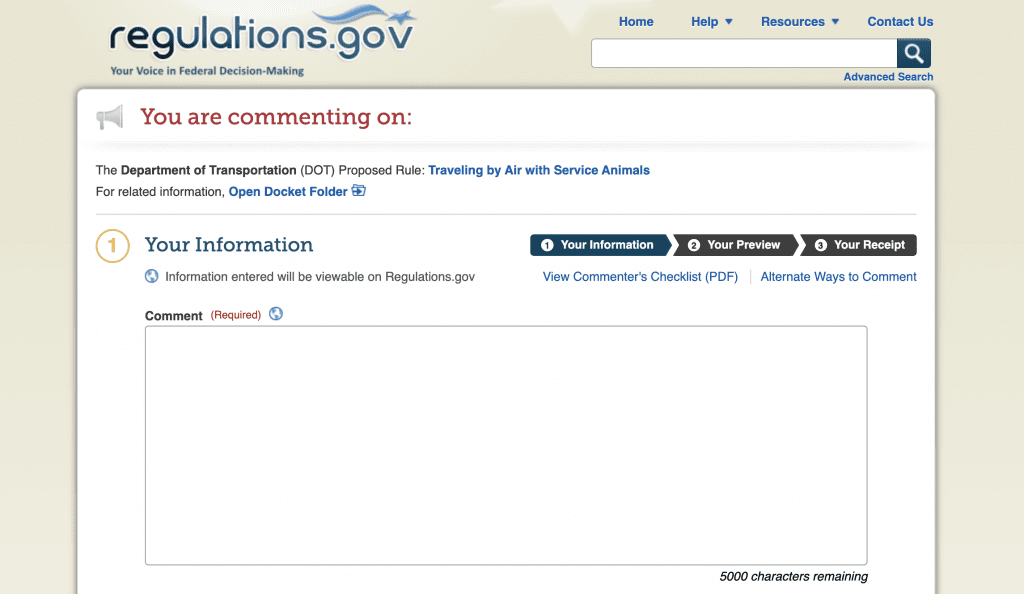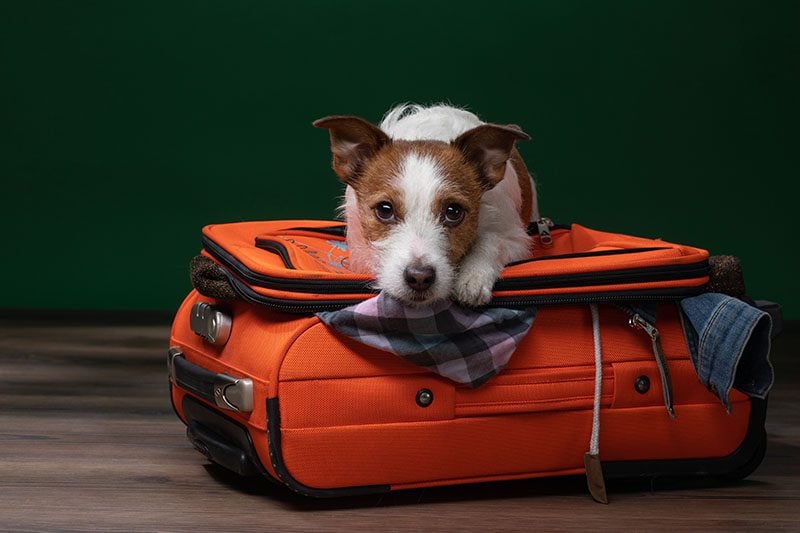Over 200,000 Americans depend on their emotional support animals. In spite of this fact, the U.S. Department of Transportation (DOT) has just unveiled a proposal that would classify ESA’s as normal pets, preventing them from traveling in the cabin with their owners. Keep reading to learn more about the new regulations and what you can do to prevent them from being enacted.
The U.S. Department of Transportation is Pushing New ESA Rules
On January 22nd, 2020, the DOT posted a notice of proposed rule-making that will forever change the regulations pertaining to emotional support animals. If the new rules are allowed to go into effect, it will change how ESAs will be classified by commercial airlines. Any animal not classified as a service animal will be banished from the cabin and forced to travel in the dangerous cargo hold. This will prevent thousands of ESA owners from flying ever again.
Why are They Changing the Rules Now?
The law that covers ESA owners is the Air Carriers Access Act (ACAA). Since 1990, the act has protected travelers needing to fly with their emotional support animal from being denied travel or incurring additional fees. Unfortunately, as ESA ownership is on the rise, so are complaints from airlines and fellow travelers. To make matters worse, the number of unscrupulous pet owners buying fake ESA letters is at an all-time high.
A big part of the problem is that the ACAA is very vague when it comes to which accommodations must be allowed to emotional support animals. This makes it difficult for airlines to ensure that they are properly following the guidelines. This confusion is also the reason that each airline has its own specific rules for ESA’s.
Because of the issues outlined above, it is clear that the ACAA must be improved upon. However, the newly proposed rules are misguided and will hurt thousands of ESA owners with legitimate needs.
See How To Post Your Comment Now
The Difference Between an ESA and a Service Animal
According to the DOT, the changes to the ACAA are intended to protect owners of service animals. A service animal is trained to do a specific task to help their owner. The most common example of a service animal is a “seeing-eye” dog for blind people. By contrast, an emotional support animal does not need specific training but instead provides a therapeutic benefit to their owner simply providing companionship.
While both kinds of working dogs play an important role in their owner’s lives, emotional support animals often do not get the credit they deserve because they do not have specific training. Unfortunately, these new DOT regulations reflect this incorrect thinking, strengthening protections for service animals while virtually eliminating them for ESA’s.
Emotional Support Animals are Essential
For patients suffering from emotional disorders, the companionship of an emotional support animal can be tremendously helpful. Studies have shown that animal companionship can have several physical and emotional benefits such as increased production of dopamine and reduced stress and anxiety. ESA’s are regularly recommended by doctors for patients who have been diagnosed by PTSD, anxiety, depression, and other neurological disorders.
Doctors also regularly recommend that patients who have a fear of flying seek out an emotional support animal to help them with anxiety when traveling. These ESA owners will be the hardest hit by the new regulations. By removing the ESA from the main cabin and placing them in the cargo hold, the patient is deprived of the benefits of ESA companionship. Even worse, they will also now have the additional stress of worrying about the safety of their ESA during the flight.
If signed into law, these new rules will unfairly keep thousands of Americans off of commercial airplanes and leave them unable to travel cross-country without driving thousands of miles.
ESA Letter Mills
One problem plaguing the emotional support animal community is the spread of shady businesses that provide illegitimate ESA letters. Because of the travel and housing benefits of owning an ESA, these letter mills provide their customers with an official-looking letter without an interview with a certified medical professional in their area. This has contributed to the DOT’s pessimistic attitude toward ESA’s.
Freedom of Movement
Being able to freely travel within your own country is considered a basic human right by the United Nations. By denying patients in need the ability to travel with their ESA, the DOT will create a situation where certain individuals will never be able to travel by air and their freedom of movement will be greatly limited.
The Cargo Hold is Not Safe For ESA’s
On average, more than one animal per week dies while being transported in the cargo hold of commercial flights in the USA. The threat is so great that the humane society recommends against having animals travel in the cargo sections when flying and even suggests that animal owners find alternate transportation plans if possible. The threat is even greater to animal breeds with flatter faces such as pugs, bulldogs and siamese cats.
So What is Next?
Because they are accountable to the taxpayers, any changes to rules regarding travel must be made public for a period of time before they are enacted. During this time the DOT must accept public comments that they will take into consideration before making a decision on whether to enact the rules. The deadline for submitting comments to the DOT on these proposed changes is April 6th, 2020. In order for your voice to be heard, it is imperative you submit your comment by the deadline.
Submitting Your Comment to the DOT



You can make a public comment in favor of protecting the rights of ESA owners online by visiting Regulations.gov. You may write up to 5000 characters in order to write a comment, tell your story and explain the reasons you believe ESA’s should be allowed to travel with their owners on airplanes. Here are some important details you should be sure to include in your comment.
- Be sure to describe yourself and your emotional support animal. We believe it’s important that the DOT understands that real people will be negatively affected by the new regulations banning ESA’s from aircraft cabins. By including personal details, your comment carries more weight.
- Write about specific times where an ESA has helped you fly. Make sure you clearly explain the problem that you had and how your support animal helped. You should make sure your comment is as detailed and specific as possible. Because the comments are public, you may choose to leave out specifics about your mental health. Any specifics you can provide like dates and airlines are helpful as well.
- If you received your recommendation for an ESA from one of our mental health professionals, you may want to mention that in your comment. We believe it’s important to draw a distinction between patients who seek out qualified medical professionals and pet owners who get fake ESA letters for the housing and travel perks.
- Finally, make sure you finish with a clear explanation of what you believe the impact of the new rules on your travel will be. You should especially make sure to describe any future plans that will be ruined or inconvenienced by the inability to travel with your ESA.
There is no minimum or maximum length for your comment. The important thing is to keep it clear, concise and specific. You can choose to comment anonymously or to sign your name to the comment. For maximum impact, we recommend you use your real name when submitting it.
See How To Post Your Comment Now
It’s Time for ESA Owners to Speak Up
Even if you do not regularly fly with your emotional support animal, we encourage you to speak up in favor of responsible owners of ESA’s. If you’ve personally been helped by the companionship of an ESA, you know that it’s an effective treatment for emotional disorders. By submitting a comment on the proposed changes to the ACAA, you’ll be helping countless others improve their mental health by traveling with their ESA.
Do Your Part for ESA’s
The current ACAA provides protections for travelers who need to travel with their emotional support animals, but it does not give them a license to be rude or to allow their ESA to behave inappropriately. When traveling with your ESA, you can do your part to build goodwill by making sure your animal does not encroach on the personal space of your fellow travelers and that they remain quiet during the flight. You should also make sure that they are either able to complete the entire flight without going to the bathroom or are able to do so in a sanitary way while flying. The vast majority of the complaints fueling the ESA rule changes are a result of ignorant owners or unruly animals.
